Experiencing an intermittent fasting headache

Have you ever gone without eating for a number of hours, then noticed you had a thumping head? No need to start googling your symptoms (never a good move!) — getting a headache from fasting is super common.

If you get headaches and suspect intermittent fasting is to blame, you likely want some answers to questions like:
Can intermittent fasting cause headaches? How? Can it be prevented? Is it a reason to stop fasting?
We hear you. Let’s look at the facts so you have the information you need to get through your fasts without a sore head.
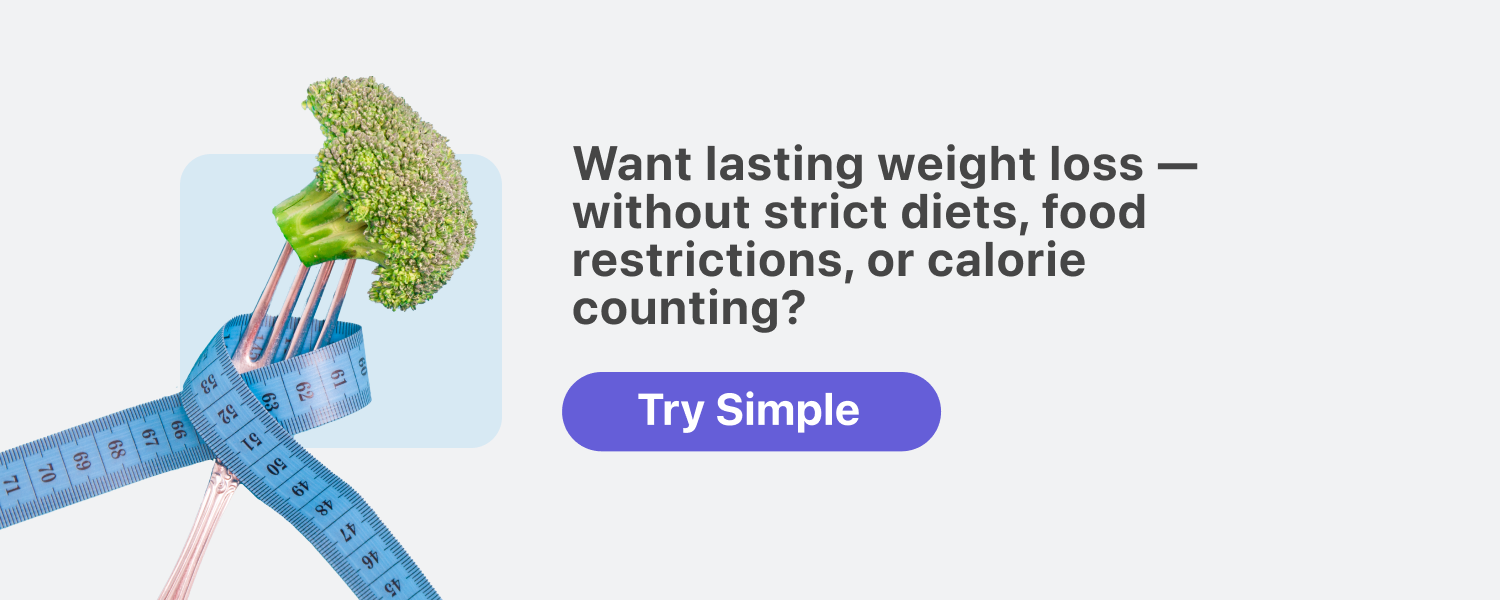
Suffering from headaches while intermittent fasting — is it normal?
Experiencing headaches while intermittent fasting is quite common, particularly in the early stages. In fact, alongside hunger and grumpiness, it’s one of the most reported intermittent fasting side effects around.
Adapting to a new eating pattern can have an impact on your body, and often in ways you don’t expect. With intermittent fasting, your body may need to adjust to the changes in meal timing and frequency, and so do you. As you make these adjustments, you’ll potentially crash into something that’s headache-inducing.
We’ll look at what these are in more detail later on, but for now, know that while not everyone will get fasting headaches, they’re a normal part of the process for many.
Important note
While generally benign, headaches can be an underlying symptom of other conditions. Fasting headaches should resolve after a week of consistent fasting, so long as you hydrate well. If they don’t, and/or if you have a headache that persists for more than 2 to 3 days or becomes unbearable, seek immediate medical support.
What is a fasting headache, anyway?
A fasting headache is a headache that occurs after not eating for 14–16 hours or more (though it can also occur after shorter fasts).
These headaches tend to be:
- mild to moderate in intensity
- steady rather than throbbing or pulsing
- felt all over the head or specifically in the forehead
You may also feel nauseous, dizzy, fatigued, or short-tempered, and you may notice muscle tension in your neck and shoulders.
If you’re a beginner to intermittent fasting — or you’re an old hand but feel your intermittent fasting is not working out the way you’d like — try our Simple quiz. We’ll set you on the right path (we love finding the right intermittent fasting schedule for beginners!), and we have content and interactive tools that can help iron any wrinkles out of your fasting practice.
Causes of headaches during intermittent fasting

Several factors can contribute to headaches during intermittent fasting. Let’s explore some of them.
Dehydration
Dehydration is a common cause of headaches during intermittent fasting, especially when you fast for longer than 16 hours. That’s because roughly 20% of your daily fluid comes from what you eat,[1] so when you reduce your food intake, you also reduce your fluid intake.
Being sufficiently hydrated is essential for our well-being, including maintaining optimal brain function. (Ever experienced brain fog or felt fuzzy-headed when you haven’t drunk enough? Then you know what we mean.)
When your body loses water, this may cause your brain tissue to shrink and contract away from your skull, making your head hurt.[2]
Losing water, minerals, and electrolytes through sweating and excretion also plays a role here. Fasting means you’ll have lower insulin levels, so you’ll lose more salt, water, and other electrolytes, like potassium. Even a small disruption in your sodium levels can trigger headaches,[3] as can low levels of potassium.
Finally, let’s think about neurotransmitters.[4] When your body doesn’t get enough water, it produces less serotonin, a neurotransmitter that helps regulate moods and sleep patterns. A dip in serotonin caused by being dehydrated can cause headaches.
To figure out if dehydration is tripping your headache switch, check the color of your pee.[5] If it’s the culprit, you’ll notice dark-colored urine. You might also feel dizzy, sleepy, and grumpy.
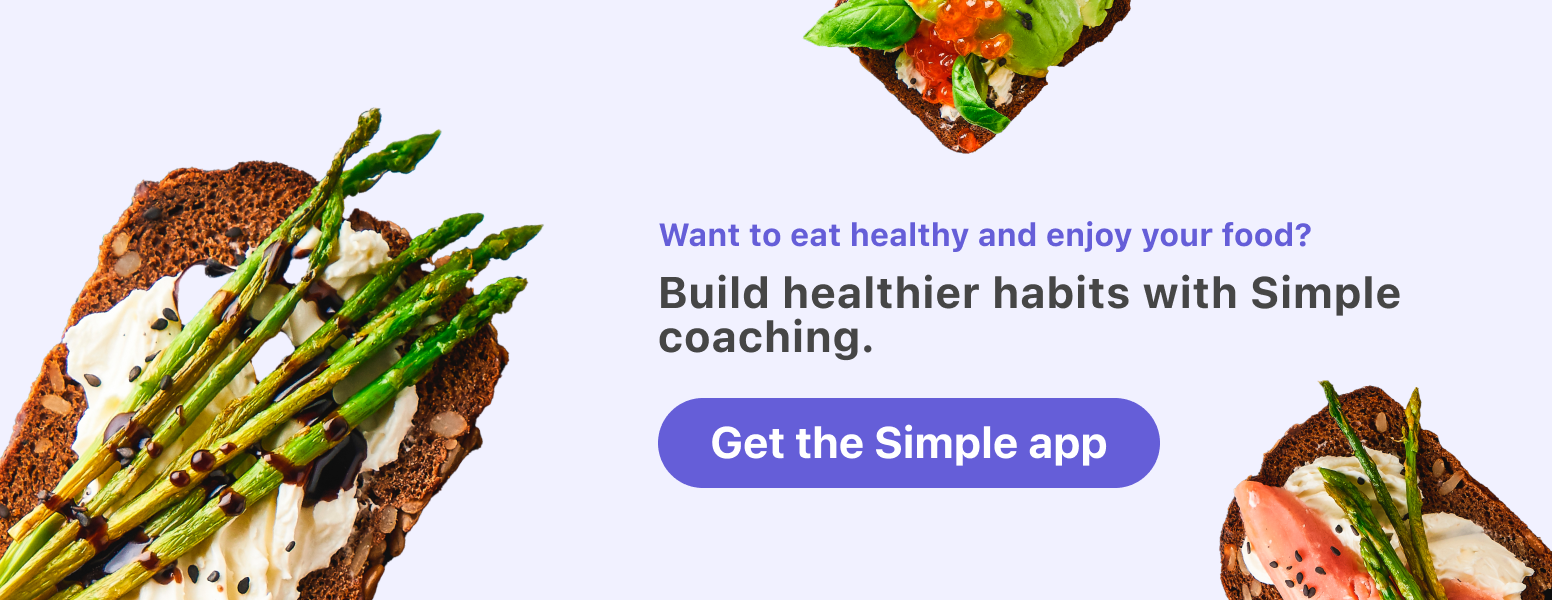
Stress
Fasting is a stressor on the body, and it’ll come as no surprise (to anyone who’s having to adult in 2023) that stress can give you a pounding head. During a fast, a headache can be triggered by increased levels of cortisol,[6] one of our main stress hormones.
Caffeine withdrawal / excess
If intermittent fasting means taking a break from your regular coffee fix — because lattes aren’t fast-friendly and you don’t enjoy drinking it black — caffeine withdrawal could be the reason for your fasting-related headaches.[7]
Caffeine narrows your blood vessels and reduces blood flow to the brain. When you cut off your coffee supply, blood flow to the brain returns to normal. This is what causes headaches, which typically go away as your body adjusts to the change.
On the flip side, overdoing caffeine can cause headaches too![7] If your foray into fasting has you leaning hard on coffee to get you going in the morning, you’re on a path to a potentially painful head.
Hypoglycemia
During fasting, your blood sugar levels will drop as your body uses up your stored glycogen. For some people, this drop can affect pain receptors and lead to a throbbing, pulsing headache.
You may remember that fasting headaches tend to be a non-pulsating pain. Hypoglycemia-induced headaches are, therefore, not a “true” fasting headache in that sense, but something to be aware of all the same.[8] They generally occur alongside other symptoms of hypoglycemia, like blurred vision, fatigue, and increased heart rate.
Poor sleep
If your sleep’s been disrupted as you’ve gotten into intermittent fasting, that can also make your head hurt. While studies in this area are limited, some evidence has linked fasting with poor sleep in some people.[9]
Your food choices could be contributing here. For instance, significantly reducing the amount of carbohydrates you eat can impact your sleep.[10]
Fasting itself may be part of the issue, too, as it can make your brain more alert, productive, and focused. When you’re not sleeping well, your brain can’t recover properly from its exertions, and that’s a pretty reliable way to cultivate an aching head.
Being someone who gets headaches
This isn’t a cause as such, but research shows that those who normally get headaches are more likely to get a fasting headache than those who don’t.[11]
Is fasting really the cause?
Based on all this, we might wonder: does fasting really cause headaches?
It’s safe to say that dehydration, low blood sugar, lack of sleep, stress, and caffeine are all causes of headaches in their own right. So, while intermittent fasting and headaches are connected, whether fasting itself is the cause is still open to debate.
What we can say is that fasting makes these things more likely, and in that way, headaches can occur in conjunction with fasting.
Common symptoms when suffering from a fasting headache
When experiencing a headache after fasting, people often report the following symptoms:
- mild to moderate pain
- pain located predominantly in the forehead
- absence of throbbing or pulsing sensations
- tension-type headache characteristics rather than migraines
- mild nausea or an upset stomach
- feelings of lightheadedness or dizziness
- increased fatigue or a general sense of low energy
- irritability or difficulty concentrating
- muscle tension in the head, neck, and shoulders
The headache may stick around throughout the fasting period and fade away within 72 hours of eating.
If you’re unsure whether your symptoms align with a fasting headache or if you’re experiencing severe or persistent headaches, talk to your doctor. They can help rule out any potential underlying health conditions.
5 tips on how to prevent headaches while intermittent fasting
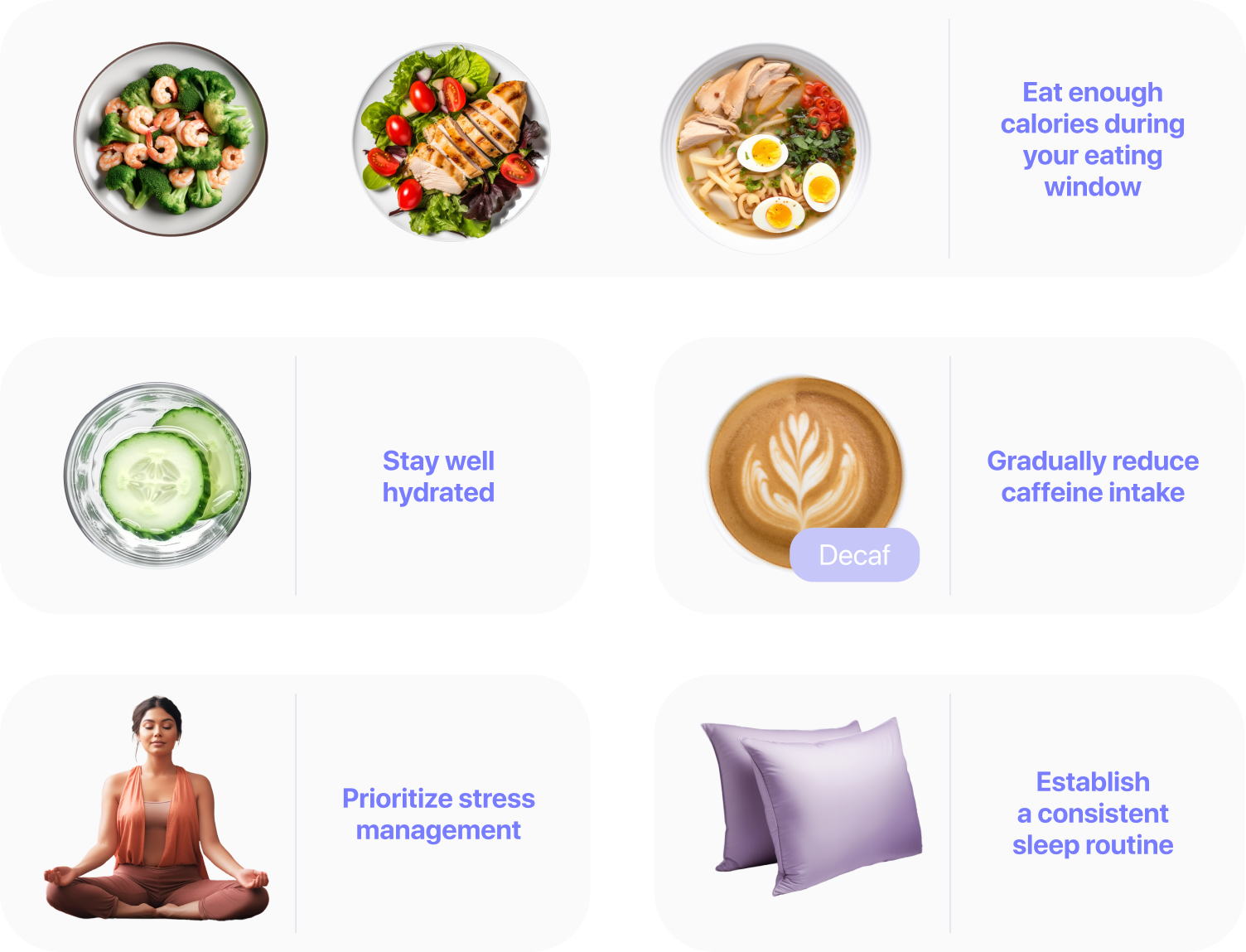
Try these five strategies to reduce your risk of headaches when intermittent fasting.
1. Eat enough calories during your eating window
Make sure to eat enough calories to support your body’s needs during your eating window.
Shoot for adding whole grains, lean proteins, healthy fats, and plenty of fruits and vegetables into your meals to help stabilize blood sugar levels and reduce the likelihood of hypoglycemia-related headaches.
For more ideas on fasting-headache-preventing nutrition, check out our guide on what to eat during intermittent fasting.
2. Stay well hydrated
Drink plenty of fluids during both your fasting and eating windows to keep you well-hydrated and reduce the risk of dehydration-related headaches. Our guide on what you can drink while fasting will give you plenty of ideas for drinks you can try (because sometimes water is BORRRING).
If you’re active, live in a hot climate, and/or sweat a lot, drinking electrolyte-rich drinks or adding a pinch of salt to your water could be valuable to help maintain your electrolyte and mineral levels.
3. Gradually reduce caffeine intake
If you drink coffee (or a lot of tea — UK readers, we’re looking at you!), gradually reduce your caffeine intake over the course of a week before starting intermittent fasting.
There are plenty of non-caffeinated options available to help ease this transition, and this slow and steady approach can help minimize caffeine-withdrawal headaches. You could also try simple swaps like drinking decaf tea or coffee instead.
And, if you’re relying on a caffeine fix to perk you up in the mornings, think about the food you’re eating as well as the timing of your fast. Focus on eating foods that give you sustained energy overall, and consider breaking your fast earlier in the day.
4. Prioritize stress management
Managing stress levels isn’t easy, we know. Life is a lot, sometimes. But practicing regular stress-management techniques can help reduce the risk of stress-induced headaches during intermittent fasting (as well as make your life better overall).
We’re talking techniques like deep breathing exercises, meditation, yoga, gentle physical movement, as well as simply engaging in activities that bring you joy. More joy, more peace, fewer headaches. What’s not to love?
5. Establish a consistent sleep routine
Aiming for 7–9 hours of quality sleep each night can lower your likelihood of headaches.[12]
You can help this along by creating a calming bedtime routine and ensuring a comfortable sleep environment. And, just like managing stress, this won’t just help with avoiding headaches — good sleep hygiene supports your entire well-being.
These five tips are things we can help you get better at. Take our Simple quiz and get set up on the app — the content there is designed to help you make meaningful changes to your lifestyle just like these so you can achieve your goals faster!
5 tips on how to relieve a headache caused by intermittent fasting
If you experience a headache when intermittent fasting, the following tips may help you find relief.
1. Hydrate
Drink plenty of water and other replenishing fluids to ensure hydration and help lift a dehydration-related headache.
And, while diet soda may lovingly call your name, avoiding sugary or caffeinated drinks is a good bet here, too, as they could make your head feel worse.
2. Rest and relax
If you can, take a break and allow yourself to rest.
Find a calm, quiet, dark environment to relax in, and try activities like deep breathing, meditation, or gentle stretching to reduce any tension in your body or mind. If you can nap, try getting a little shut-eye. (Note: don’t try this while at work, operating heavy machinery, or in the middle of a heart-to-heart with your partner.)
3. Apply a cold or warm compress
Try applying a cold or warm compress to your forehead to soothe headache pain. Experiment with both options to find what works best for you.
4. Consider over-the-counter pain relievers
Non-prescription pain relievers such as acetaminophen or ibuprofen can help resolve headache pain. Make sure to use them as directed and consult with a healthcare professional if you have any underlying medical conditions or concerns.
5. Eat
If you need to break your fast because your head hurts, do. (You can always try again tomorrow.) Focus on getting some high-fiber carbohydrates, vegetables, protein, and healthy fats into that fast-breaking meal to provide lots of nutrients and steadily raise your blood sugar.
Test out these strategies for how to deal with headaches during fasting and see what works for you. And remember — if your headaches are severe, persistent, or accompanied by other concerning symptoms, have them checked out by your doctor.
When should you consult a doctor?
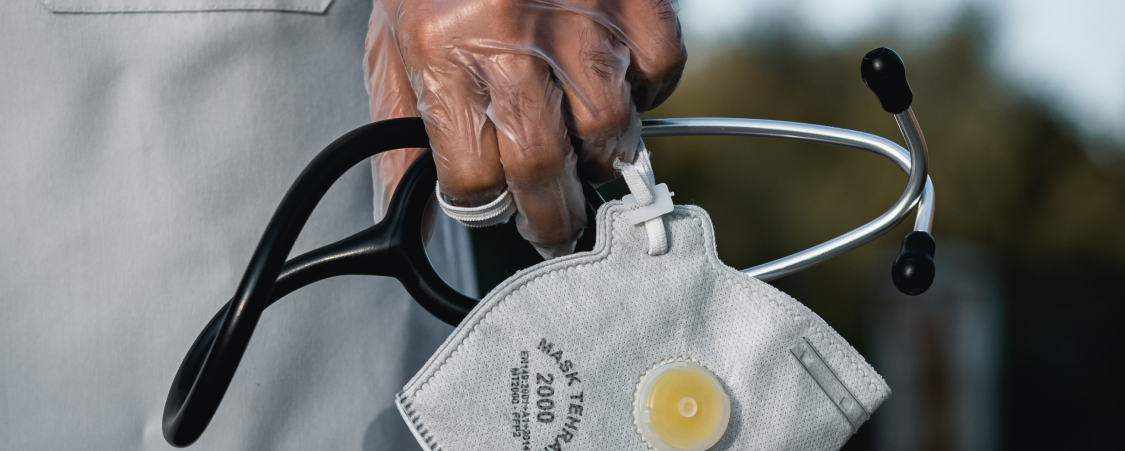
While occasional headaches when intermittent fasting are generally benign, there are times when it makes sense to talk to your doctor.
Times when:
- headaches are severe, persistent, or significantly impact your daily life
- headaches are accompanied by other symptoms, such as dizziness, blurred vision, or confusion
- headaches worsen over time despite implementing preventive measures and relief strategies
- you have a history of migraines, other chronic headache disorders, or other neurological conditions
- over-the-counter pain relievers don’t help or are contraindicated for you
- you’re unsure about the underlying cause of your headaches
- you have a pre-existing medical condition or are taking medications that may interact with intermittent fasting
Seeking professional medical guidance will help determine the right course of action for what you’re experiencing.
It doesn’t have any magical headache-alleviating qualities, but lemon water may help with fasting headaches because it’s hydrating and caffeine-free.
But hold up — before you get squeezing, let’s check: does lemon water break a fast?
Good news there, too — lemon water is also calorie-free, so it’s fast-friendly!
It’s important to know what breaks a fast, though, so you can get maximum results from your intermittent fasting. Check out the link to learn more and stay calorie-free during your fast!
Intermittent fasting is healthy for women, though there are some specific factors to consider to ensure you stay safe. Check out our guide on intermittent fasting for women to make sure you’re completely in the know.
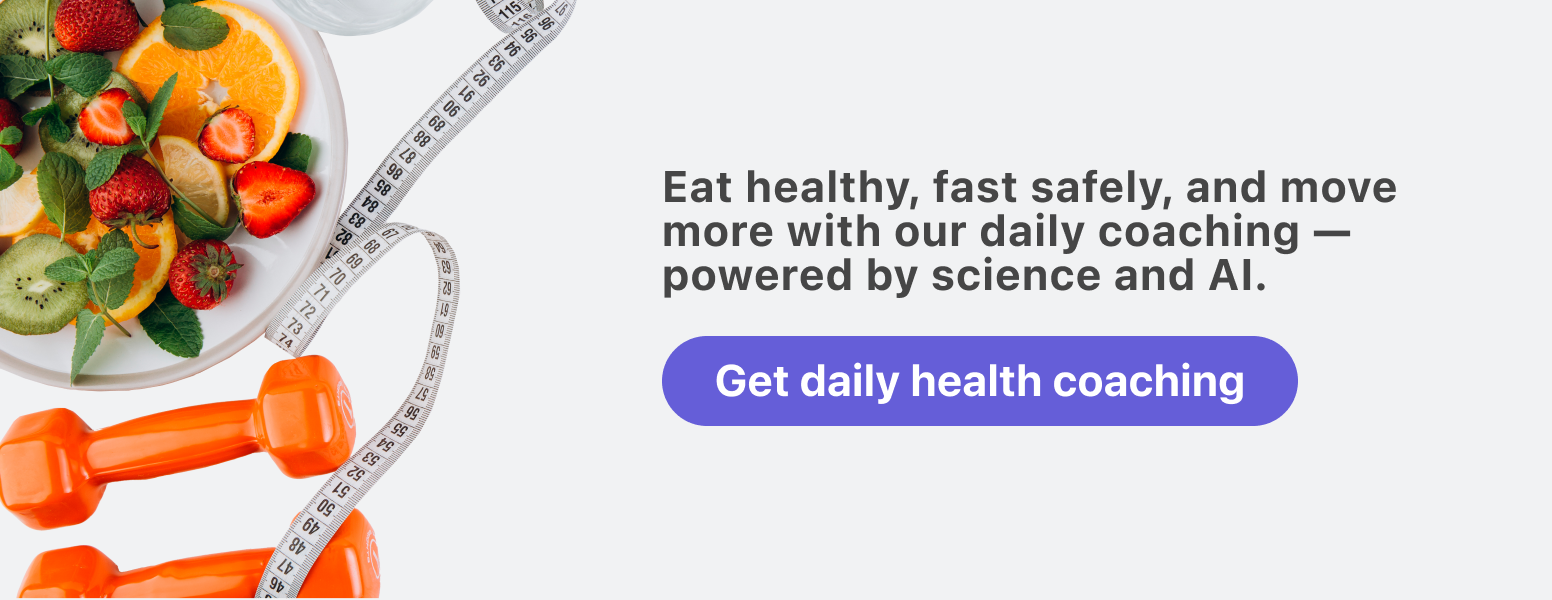
- How much water do you need? Harv Womens Health Watch. 2002 Sep;10(1):3.
- Kempton MJ, Ettinger U, Foster R, Williams SCR, Calvert GA, Hampshire A, et al. Dehydration affects brain structure and function in healthy adolescents. Hum Brain Mapp. 2011 Jan;32(1):71–9.
- Pogoda JM, Gross NB, Arakaki X, Fonteh AN, Cowan RP, Harrington MG. Severe Headache or Migraine History is Inversely Correlated With Dietary Sodium Intake: NHANES 1999-2004. Headache. 2016 Apr;56(4):688–98.
- Masento NA, Golightly M, Field DT, Butler LT, van Reekum CM. Effects of hydration status on cognitive performance and mood. Br J Nutr. 2014 May 28;111(10):1841–52.
- Belasco R, Edwards T, Munoz AJ, Rayo V, Buono MJ. The Effect of Hydration on Urine Color Objectively Evaluated in CIE L*a*b* Color Space. Front Nutr. 2020 Oct 26;7:576974.
- Kim BH, Joo Y, Kim MS, Choe HK, Tong Q, Kwon O. Effects of Intermittent Fasting on the Circulating Levels and Circadian Rhythms of Hormones. Endocrinol Metab (Seoul). 2021 Aug;36(4):745–56.
- Nowaczewska M, Wiciński M, Kaźmierczak W. The Ambiguous Role of Caffeine in Migraine Headache: From Trigger to Treatment. Nutrients [Internet]. 2020 Jul 28;12(8).
- Islam MR, Nyholt DR. Glucose-Related Traits and Risk of Migraine-A Potential Mechanism and Treatment Consideration. Genes [Internet]. 2022 Apr 22;13(5).
- McStay M, Gabel K, Cienfuegos S, Ezpeleta M, Lin S, Varady KA. Intermittent Fasting and Sleep: A Review of Human Trials. Nutrients [Internet]. 2021 Oct 1;13(10).
- Mantantzis K, Campos V, Darimont C, Martin FP. Effects of Dietary Carbohydrate Profile on Nocturnal Metabolism, Sleep, and Wellbeing: A Review. Front Public Health. 2022 Jul 13;10:931781.
- Torelli P, Manzoni GC. Fasting headache. Curr Pain Headache Rep. 2010 Aug;14(4):284–91.
- Sullivan DP, Martin PR, Boschen MJ. Psychological Sleep Interventions for Migraine and Tension-Type Headache: A Systematic Review and Meta-Analysis. Sci Rep. 2019 Apr 23;9(1):6411.
